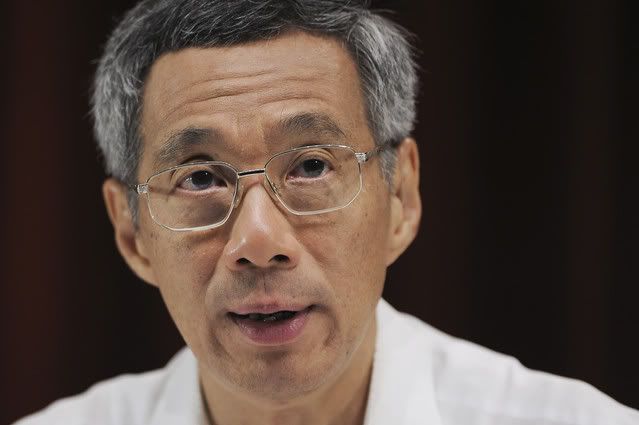
Singapore’s Prime Minister Lee Hsien Loong deepened efforts to counter voter grievances by agreeing to a pay cut this week, as higher taxi fares and subway failures fuel discontent over living costs and government efficiency.
Lee’s annual income will fall 36 percent to S$2.2 million ($1.7 million) while the president’s compensation will be reduced 51 percent to S$1.54 million, based on the government- appointed Committee to Review Ministerial Salaries’ recommendations released yesterday. New ministers will make about S$1.1 million, down from S$1.58 million.
“People feel they should be getting better solutions for the top dollar that the ministers are making,” said Eugene Tan, a political commentator and assistant professor of law at the Singapore Management University. “The government may have dealt with the ministerial pay issue but there will be equally hot- button issues that will again hobble their ability to make headway in terms of governing.”
Lee, 59, tightened rules for foreign workers and implemented measures to cool housing prices after his People’s Action Party won the May 2011 general election with the smallest margin of popular votes since independence in 1965. The efforts have been overshadowed by a series of unprecedented subway breakdowns, floods across the island and costlier cab rides.
“We still have problems with flooding and transport,” said Joseph Teng, a 62-year-old retiree in Singapore. He said the ministerial pay reduction is “a good start and sounds like a hefty cut, but if you look at the final sum, why is it still so much?”
Highest Paid
Singapore’s ministers are among the world’s highest paid as the government previously benchmarked their wages against salaries of chief executive officers and other top earners in the country. Their pay was used by opposition parties in last year’s election to stir voter unhappiness with the government over the island’s income gap.
While investor- and immigration-friendly policies have helped drive Singapore’s economic success, making the country the easiest place to do business according to the World Bank, its growth has come with widening income disparity. The island’s Gini coefficient, an income inequality measure, rose to 0.48 in 2010 from 0.444 in 2000, according to the statistics department. A reading of zero means income equality, while a reading of one means complete inequality.
Record Growth
The city state’s gross domestic product increased 41-fold from 1960 to S$285 billion in 2010, based on 2005 market prices, and the economy grew 4.8 percent last year after expanding a record 14.5 percent in 2010.
Voter discontent has grown with the influx of foreign workers, which boosted the population by about a fifth since 2005 to support the economy’s rapid expansion. More than a third of Singapore’s 5.2 million inhabitants are non-citizens.
The island has the highest proportion of millionaire households globally, according to the Boston Consulting Group, contributing to higher property and consumer prices that have pushed up living costs for its poorer citizens. Inflation was 5.7 percent in November, matching the fastest pace since 2008.
Singapore’s home prices have surged, prompting the government to introduce measures to cool the property market since 2009. Last month, the country imposed additional taxes on purchases of private residential property to curb excessive investment.
Taxi Outcry
Adding to price pressures, ComfortDelGro Corp. (CD), Singapore’s biggest taxi and bus operator, raised cab fares last month, sparking an outcry from passengers and drivers. Singapore Press Holdings Ltd.’s My Paper reported Comfort cabs suffered a drop in daily takings of at least 20 percent on the first day of the price adjustment.
“It is the hypocrisy of the company to say this is to help the taxi drivers,” said Daniel Tan, a driver for Comfort. “They paint a picture of looking after the drivers but they look after themselves first.”
Within days of the fare increase, Singapore suffered its worst subway disruptions on record, leading to a public rally calling for rail operator SMRT Corp. (MRT)’s Chief Executive Officer Saw Phaik Hwa to step down.
The subway line running through the shopping district to the central part of the island was shut on Dec. 15 after damage to its power rail, and was closed again less than 36 hours later. The breakdowns affected commuters heading to the Orchard Road shopping district on the last weekend before Christmas.
Changing Tact
Compounding the government’s woes, parts of Singapore were affected by flash floods on Dec. 23, including the Orchard area. That followed inundations earlier in the year.
The People Action’s Party worst election result since independence last year prompted Lee to pledge his party will change the way it governs and engage the population more in decision-making.
The party, co-founded by Prime Minister Lee’s father, Lee Kuan Yew, built the island into a global financial center and trading hub with a mix of strict laws, a focus on education, a pro-business attitude and openness to foreign talent. As younger generations reap the benefits of Singapore’s wealth and international education, they have increasingly questioned the ruling party and demanded changes.
“Some Singaporeans take years to earn and save what they get in a month, it’s not right,” said Andy Latif, a 29-year-old technician, referring to ministerial salaries. “It’s a right step by the government for now. Hopefully there will be further cuts in future.”

